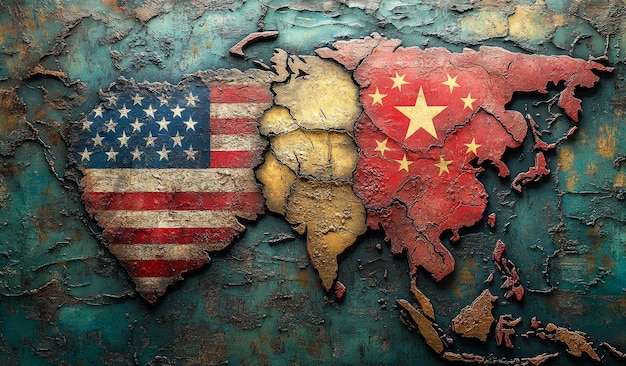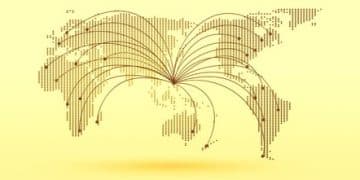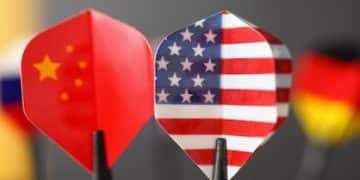US Response to China’s Growing Influence in Africa

The United States is likely to adopt a multifaceted approach, combining strategic economic partnerships, security cooperation, and diplomatic engagement, to counter and manage China’s expanding influence across the African continent while promoting its own interests and values.
The intricate geopolitical dance between global superpowers often plays out on distant stages, and few are as critical as Africa. The assertive and expanding presence of China across the continent has undeniably reshaped its geopolitical landscape, prompting a critical question: How Will the US Respond to the Growing Influence of China in Africa? This dynamic is not merely about competition for resources or markets; it encapsulates a broader struggle for influence, ideological alignment, and the future of international order.
The evolving landscape of US-China relations in Africa
The relationship between the United States and China on the African continent is a complex tapestry woven with threads of competition, cautious cooperation, and strategic maneuvering. For decades, the US has viewed Africa primarily through the lens of security, development aid, and counter-terrorism, establishing long-standing diplomatic and military ties. However, China’s rise as a global economic powerhouse has brought a new paradigm, challenging traditional Western approaches and forcing a reassessment of US engagement.
China’s strategy in Africa has been characterized by robust infrastructure development, extensive trade, and significant investment, often with fewer political conditionalities than Western lenders. This approach has resonated with many African nations eager for rapid development, leading to a substantial increase in China’s footprint across various sectors. From sprawling railway networks and modern ports to digital infrastructure and resource extraction, Chinese companies, often state-backed, have become ubiquitous, fundamentally altering the economic and political dynamics within the continent.
China’s diverse engagement strategies
China’s engagement extends beyond mere economic transactions, encompassing cultural exchange programs, medical missions, and diplomatic outreach. This multi-pronged approach aims to foster goodwill and long-term partnerships. The Belt and Road Initiative (BRI) stands as a prime example of China’s ambition to connect global markets through infrastructure, and Africa is a cornerstone of this grand design.
- Infrastructure Development: China has funded and built thousands of kilometers of roads, railways, ports, and power plants, essential for Africa’s growth.
- Resource Extraction: Significant investments in minerals, oil, and gas have secured vital resources for China’s industrial base.
- Trade and Investment: China is Africa’s largest trading partner, with bilateral trade volumes consistently increasing over the past two decades.
- Digital Footprint: Chinese companies like Huawei have played a major role in developing Africa’s telecommunications infrastructure, raising concerns about data security and influence.
The sheer scale and speed of Chinese engagement have caught many Western observers off guard, highlighting a perceived vacuum left by traditional powers. This historical context is crucial for understanding the current dilemma facing the United States.
In essence, the US response is not just about China; it’s about re-evaluating its own priorities and strategies in a rapidly changing geopolitical environment. The objective is to navigate competition while ensuring African nations maintain their sovereignty and avoid becoming pawns in a new Cold War.
Shifting US focus: From counter-terrorism to economic competition
Historically, the cornerstone of US foreign policy in Africa has been dominated by concerns related to counter-terrorism, humanitarian aid, and democratic governance. While these remain important, the escalating economic and geopolitical influence of China has necessitated a significant pivot in Washington’s strategic priorities. The new focus is increasingly on economic competition and strategic partnerships, aiming to offer African nations a viable alternative to China’s state-led development model.
The shift reflects a recognition that China’s engagement in Africa, particularly its “no-strings-attached” approach to lending and investment, has created a powerful allure for cash-strapped African governments eager for rapid infrastructure development. The US understands that simply criticizing China’s debt diplomacy or environmental standards is insufficient. A credible and compelling alternative must be presented.
Key pillars of the new US approach
The Biden administration, in particular, has articulated a strategy prioritizing investment in African economies, supporting good governance, and fostering stronger trade relationships. This includes initiatives like Prosper Africa, aimed at increasing two-way trade and investment between the US and African nations. The emphasis is on private sector-led growth, transparency, and sustainable development.
- Prosper Africa: An initiative designed to boost trade and investment between the US and African countries, focusing on diverse sectors like technology, energy, and agribusiness.
- Power Africa: A long-standing program focused on increasing access to electricity across the continent, utilizing various energy sources and technologies.
- Digital Transformation: Supporting the development of secure and open digital ecosystems, contrasting with concerns over Chinese technology providers.
- Health and Climate Initiatives: Continuing support for public health, pandemic preparedness, and climate change adaptation, areas where the US has historically been a strong partner.
Instead of merely reacting to China, the US aims to proactively build deeper, more diversified relationships that genuinely benefit African populations. This involves supporting African-led solutions, strengthening democratic institutions, and promoting human rights.
The challenge for the US lies in overcoming skepticism, given its past tendency to engage with Africa primarily during crises. Sustained, long-term commitment and tangible economic benefits will be crucial for the US to regain and solidify its standing as a preferred partner, demonstrating that its engagement is not just transactional but transformational.
Strategic re-engagement: New partnerships and initiatives
In response to China’s deep economic footprint, the United States is actively pursuing a strategy of strategic re-engagement with African nations, moving beyond traditional aid models to forge more robust and diversified partnerships. This involves a multi-faceted approach encompassing diplomatic outreach, security cooperation, and new economic initiatives designed to offer compelling alternatives and strengthen existing alliances.
A key aspect of this re-engagement is recognizing the agency of African nations. The US aims to position itself as a partner that respects sovereignty and supports self-determined growth, rather than dictating terms. This reorientation seeks to counter the perception that US engagement is conditional or less flexible than China’s offerings.

Diplomatic and security re-calibration
Beyond economics, the US is also recalibrating its diplomatic and security engagements. This includes high-level visits, increased diplomatic presence, and greater support for regional security initiatives. The goal is to reinforce the US as a reliable partner in addressing shared challenges, from combating terrorism to promoting regional stability.
The US is also emphasizing its unique value proposition: democratic values, transparent financing, and a commitment to human rights. While China often avoids commenting on internal political affairs, the US frames its engagement around these principles, arguing that they lead to more sustainable and equitable development outcomes.
- High-Level Engagements: Frequent visits by top US officials to African countries underscore the continent’s strategic importance.
- Security Cooperation: Continued training and support for African military forces to counter extremist threats and promote regional stability.
- Multilateral Diplomacy: Collaboration with international bodies and regional organizations like the African Union to address continental challenges collectively.
- People-to-People Ties: Investments in educational exchange programs, cultural initiatives, and diaspora engagement to foster long-term relationships.
The US is also seeking to leverage its alliances with European partners, particularly former colonial powers like France and the UK, to coordinate efforts and amplify impact. This collaborative approach recognizes that no single nation can effectively counter China’s influence unilaterally.
Ultimately, the effectiveness of this re-engagement strategy will hinge on its consistency and the palpable benefits it delivers to African populations. It requires sustained investment, tailored approaches to different national contexts, and a genuine commitment to empowering African leadership.
Addressing concerns: Debt, transparency, and governance
One of the primary facets of the US response to China’s influence in Africa centers on highlighting and addressing critical concerns related to debt sustainability, transparency in lending practices, and governance. While China’s infrastructure-for-resources model has facilitated rapid development, it has also raised questions about the long-term economic stability of recipient nations and the potential for increased dependency.
The US, along with other Western partners and international financial institutions, has consistently voiced concerns about “debt traps,” where countries become over-indebted to China, potentially compromising their sovereignty or ceding control over strategic assets. This narrative, while sometimes debated, serves as a crucial point of differentiation in the US approach.
Promoting sustainable development and governance
In contrast to perceived Chinese opacity, the US emphasizes transparent and rule-based engagement. This includes promoting adherence to international standards for lending, such as those set by the G7 and the OECD, and encouraging robust debt management practices within African countries. The aim is to empower African governments to make informed decisions about their financing options.
Furthermore, concerns about governance extend to labor practices, environmental protection, and human rights. US engagement often incorporates conditionalities related to these issues, arguing that good governance and respect for human rights are foundational for sustainable and inclusive growth. This contrasts with China’s official policy of non-interference in sovereign affairs, which critics argue can sometimes enable corrupt practices.
- Debt Sustainability Advocacy: Encouraging responsible borrowing and lending practices, and advocating for debt restructuring where necessary.
- Promoting Transparency: Working with African governments to ensure public access to contract details and loan agreements.
- Capacity Building: Providing technical assistance to strengthen financial management and governance institutions in host countries.
- Environmental Standards: Supporting projects that adhere to high environmental safeguards, contrasting with concerns over China’s large-scale projects.
The debate around transparency and debt is complex, with African leaders often expressing a primary desire for swift development capital, regardless of the source. The US challenge is to demonstrate that its approach to sustainable development, though potentially slower, offers more durable and equitable outcomes.
Ultimately, the effectiveness of the US narrative will depend on its ability to provide tangible, competitive alternatives that meet Africa’s development needs without imposing undue burdens or perceived paternalism. It’s a delicate balance of providing a warning while simultaneously offering a better path forward.
The role of multilateralism and international cooperation
Recognizing the immense scale of Africa’s development needs and the multifaceted nature of global influence, the United States is increasingly prioritizing multilateralism and international cooperation as a core component of its strategy. The challenge posed by China’s extensive engagement is too significant for any single nation to address alone, necessitating coordinated efforts with allies and international bodies.
This approach leverages collective resources, shared expertise, and common values to amplify impact and provide a more robust alternative to China’s bilateral deals. It also aims to reinforce the rules-based international order, which the US views as being challenged by China’s growing global assertiveness.

Coordinating with global partners
The US is actively engaging with key allies such as the European Union, the United Kingdom, Japan, and India, all of whom have their own distinct interests and relationships in Africa. Through forums like the G7 and G20, discussions focus on harmonizing development finance, promoting transparency, and supporting regional integration initiatives within Africa.
Collaboration with international financial institutions like the World Bank and the International Monetary Fund (IMF) is also critical. These institutions play a vital role in providing concessionary loans, technical assistance, and policy advice, often with stronger governance and transparency conditionalities. The US supports these institutions as a counterpoint to some of China’s direct state-to-state lending.
- G7/G20 Initiatives: Aligning strategies and pooling resources with developed nations to support African economies.
- Working with African Union: Strengthening partnerships with the AU and other regional economic communities to support African-led development agendas.
- Global Climate Action: Collaborating on climate change mitigation and adaptation efforts, an area of growing importance and shared concern.
- Health Security Partnerships: Continuing to work with global health organizations and partners to build resilient health systems, as seen during the COVID-19 pandemic.
The strategy is not about dictating to African nations but about offering a broader array of choices and ensuring that development pathways are sustainable, inclusive, and aligned with international best practices.
By fostering a united front with like-minded partners, the US aims to create a stronger, more attractive ecosystem for investment and development in Africa, one that upholds democratic values and promotes long-term economic stability over short-term gains. This collaborative approach recognizes that Africa’s future prosperity is intrinsically linked to global stability.
Future outlook: Navigating a complex geopolitical landscape
The future of US engagement in Africa, particularly in light of China’s pervasive influence, promises to be a continuous exercise in strategic adaptation and diplomatic dexterity. There is no simple solution or single policy that will definitively “win over” Africa, as the continent’s diverse nations will continue to pursue relationships that best serve their individual national interests.
The US response is likely to evolve, characterized by a pragmatic blend of competition and, where interests align, cautious cooperation. While China’s economic might and speed of delivery are undeniable, the US retains significant advantages, including its long-standing institutional ties, private sector investment capacity, and a shared history of democratic values with many African nations.
Enduring challenges and opportunities
One of the enduring challenges for the US will be to maintain consistent and sustained engagement, irrespective of domestic political shifts. A stop-and-go approach undermines trust and allows competitors to fill perceived vacuums. Furthermore, the US must avoid the pitfall of framing its Africa policy solely as a reaction to China; it must be rooted in a genuine commitment to Africa’s development and prosperity.
Opportunities abound for the US to leverage its strengths. Promoting democracy and good governance, for instance, can resonate deeply with a growing number of African citizens who seek accountability from their leaders. Investing in human capital, through education and health initiatives, also offers a powerful long-term differentiator.
- Sustained Engagement: Ensuring consistent policy and resource allocation to Africa beyond electoral cycles.
- African Agency: Respecting and supporting African-led initiatives and decision-making processes.
- Private Sector Activation: Mobilizing US private sector capital and expertise to drive sustainable growth and job creation.
- Narrative Control: Effectively communicating the benefits of US partnership and distinguishing it from competitor models.
The competition between the US and China in Africa is not a zero-sum game, but rather a dynamic interaction that will shape the continent’s trajectory for decades to come. African nations are increasingly adept at balancing relationships, seeking the best terms from all partners, and asserting their sovereignty.
Ultimately, the US response will be measured by its ability to offer durable, mutually beneficial partnerships that truly empower African nations, rather than merely containing a rival. It’s about demonstrating that American engagement supports a stable, prosperous, and self-reliant Africa in a multipolar world.
| Key Response Pillar | Brief Description |
|---|---|
| 📈 Economic & Trade Focus | Shifting from aid to comprehensive investment & trade, offering private sector-led growth alternatives. |
| 🤝 Strategic Partnerships | Deepening diplomatic ties, security cooperation, and supporting African-led initiatives. |
| ⚖️ Governance & Transparency | Emphasizing debt sustainability, transparent lending, and democratic principles. |
| 🌍 Multilateral Cooperation | Working with allies and international bodies to amplify impact and offer collective solutions. |
Frequently asked questions about US-China influence in Africa
Africa is strategically vital due to its vast natural resources, rapidly growing young population, emerging markets, and significant voting bloc in international organizations. For the US, it’s about stability, counter-terrorism, and democratic values. For China, it’s about securing resources, expanding markets for its goods, and extending its Belt and Road Initiative’s global reach, deepening its geopolitical influence.
China typically offers large-scale infrastructure loans with fewer political conditionalities, often leveraging state-backed enterprises. The US focuses more on private sector-led investment, governance, human rights, and democratic principles. China prioritizes economic ties and non-interference, while the US aims for more holistic partnerships, including military and security cooperation.
The US is concerned about “debt traps,” where African nations might become overly indebted to China, potentially losing control over strategic assets like ports or facing increased economic and political leverage from Beijing. The US also advocates for greater transparency in loan agreements and sustainable debt management practices to prevent financial instability in African countries.
The US has launched initiatives like Prosper Africa, aimed at increasing two-way trade and investment. It also promotes programs like Power Africa for energy development and supports secure digital infrastructure. The US emphasizes partnering with African nations, providing transparent financing, and investing in human capital and public health to offer viable alternatives to China’s models.
Yes, competition can be beneficial for African nations as it creates more choices for development finance, trade partners, and diplomatic alignments. African leaders can leverage this rivalry to secure better terms, diversify their partnerships, and ultimately drive their own development agendas. However, it also requires careful navigation to avoid becoming caught in geopolitical rivalries.
Conclusion
The US response to China’s growing influence in Africa is not a static policy but a dynamic, evolving strategy. It reflects a sophisticated understanding of a continent undergoing profound transformation, eager for development, sovereignty, and a voice on the global stage. While traditional concerns about security and aid remain, the pivot towards robust economic partnerships, transparent financial practices, and multilateral cooperation signifies a more strategic and competitive engagement. The effectiveness of this response hinges on consistent commitment, the tangible benefits offered to African populations, and a genuine respect for their leadership and priorities. Ultimately, the United States seeks to foster an Africa that is stable, prosperous, and resilient, ensuring that its rich potential can be realized independently of any single external power’s agenda.





